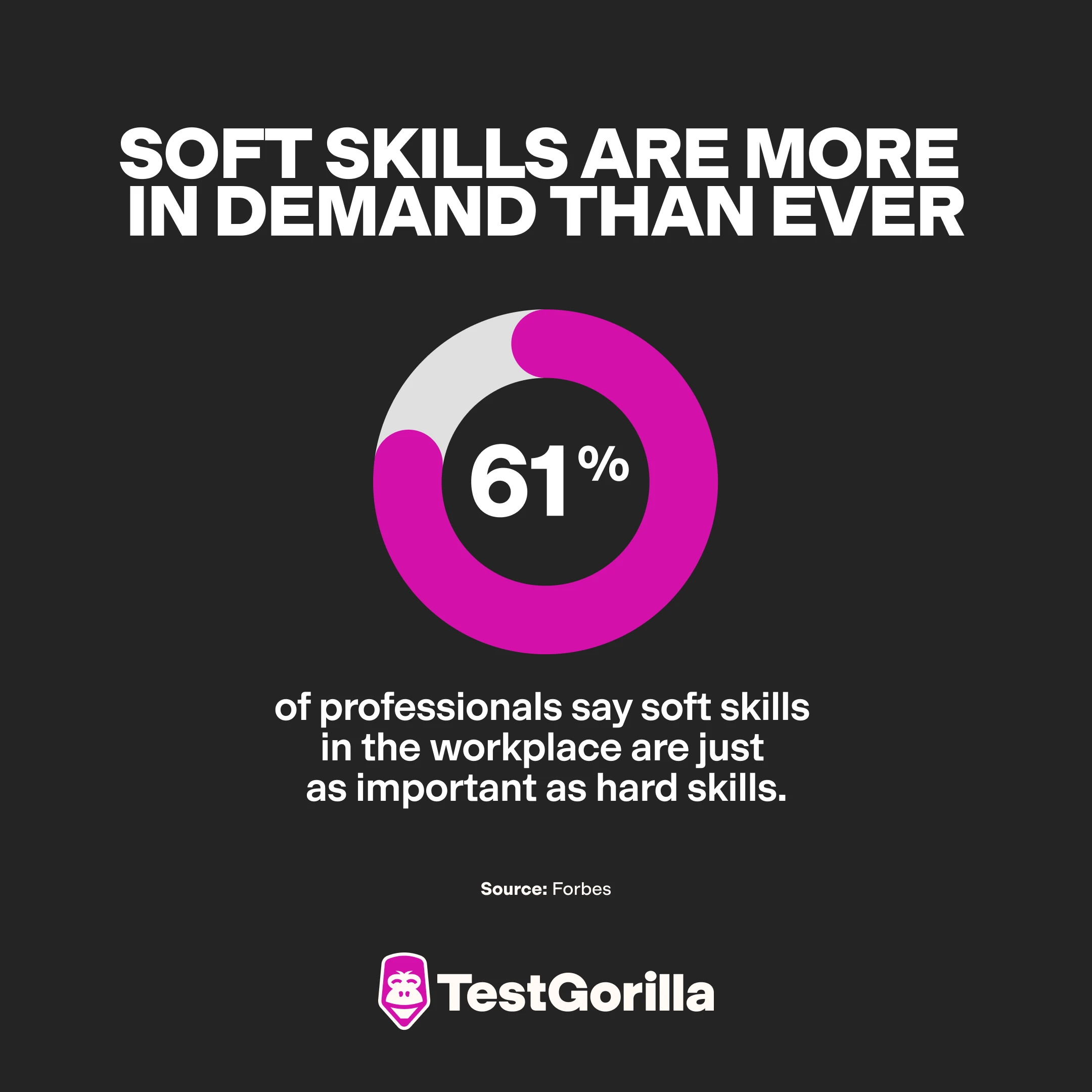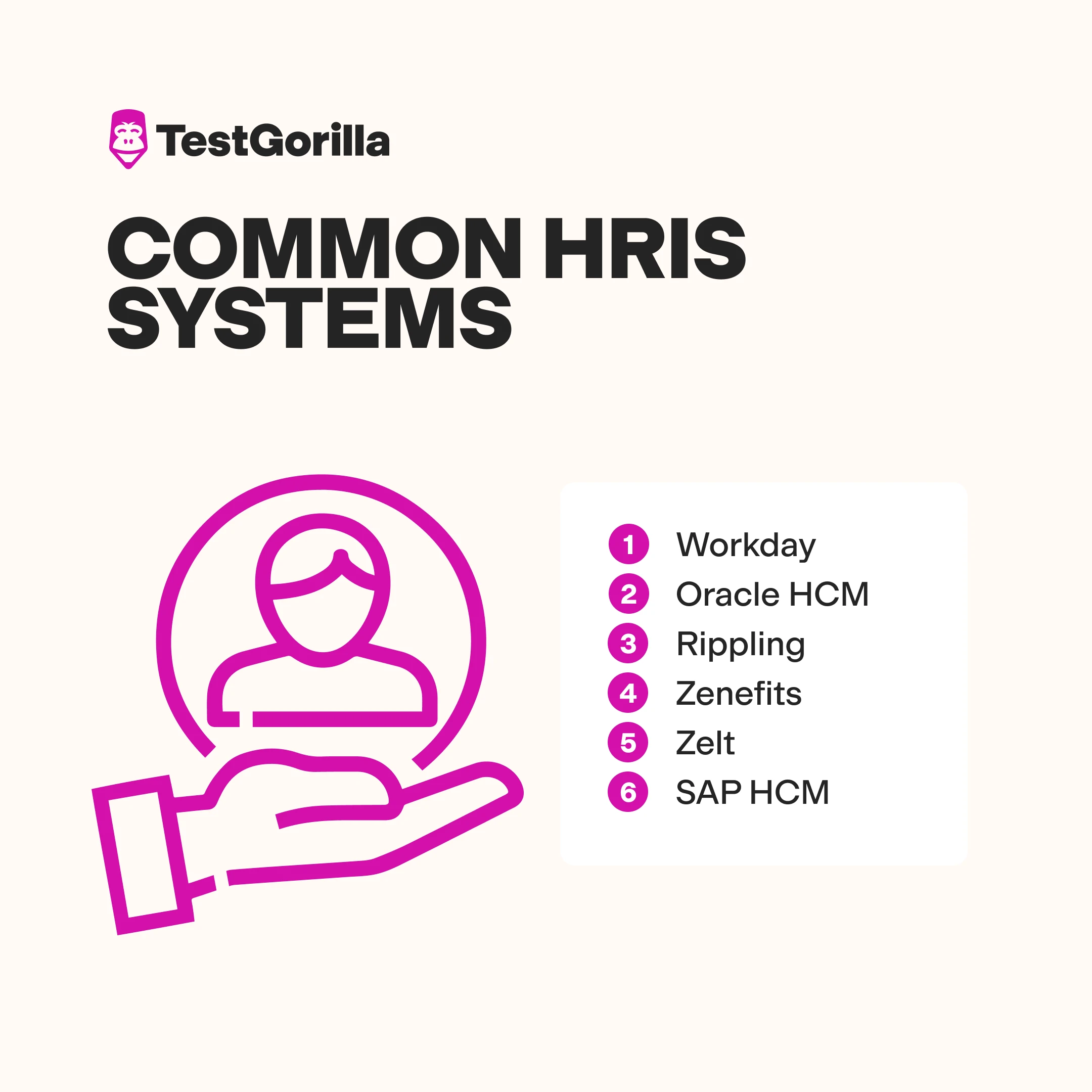20 in-depth interview questions for HR positions
Find top HR candidates with TestGorilla's skills assessments
To hire an HR professional, you need to do two things. You have to ensure the open position can attract the best applicants and you must be able to evaluate their skills accurately.
If you use skill tests (such as our HR Fundamentals test), you can effortlessly learn about your candidates’ abilities.
You can then invite the best applicants to an interview to gain a more in-depth understanding of their skills and experience and discuss with them the role.
However, knowing which questions to ask in the interview process is difficult. How can you make a comprehensive list quickly and efficiently?
The answer is in this article. Check our 20 in-depth interview questions to ask applicants for HR positions, along with our sample answers. With skills tests and the right interview questions, you’ll be able to hire the right professional stress-free.
20 in-depth interview questions for hiring an HR professional
Ask your interviewees a few of these in-depth interview questions for HR positions and evaluate their responses using the sample answers below.
1. Tell us about yourself and your experience in HR.
Applicants answering this interview question for an HR position should introduce themselves, mention any HR qualifications they have, and talk about their experience. They should briefly discuss their soft and technical skills and explain how they use them in their HR role to carry out their duties.
Your candidates may also discuss the personality traits that help them perform well in HR. Check if these traits match your expectations and your company mission and values.
2. Name your three best soft skills.
Soft skills play a key part in HR: More than 61% of professionals think soft skills are just as important as hard skills. Therefore, assessing these skills is important.
Each applicant will likely respond with a unique set of soft skills they use in their role. For example, some candidates may mention that their best skills include communication, time management, and the ability to solve problems.
Others might list different skills, such as project management, active listening, and leadership.
You can verify your applicants’ soft skills with skill tests such as our Communication, Time Management, Problem Solving, and Leadership and People Management tests.
Don’t forget to ask follow-up questions to determine how your applicant uses these skills to handle challenging tasks in HR.
3. Name your three best hard skills.
It’s important to check your applicants’ hard skills before you hire a candidate. Each applicant may name a different set of skills, but some of the essential hard skills HR professionals should have include:
Microsoft Office skills
A strong knowledge of the fundamentals of HR
Business ethics
Applicants should be able to explain why each of these skills is necessary.
For example, HR professionals need strong business ethics to be able to apply your company policy and implement strong anti-harassment, anti-discriminatory, and legal compliance procedures.
If you need to evaluate those skills, consider our Microsoft Windows, HR Fundamentals, and Business Ethics and Compliance tests.
4. Why did you apply for this HR position?
The best answers to this interview question for an HR position will show that the candidate has researched your company and is aware of its achievements and successes. Promising candidates will explain how their abilities and passion match your company’s mission and vision.
For example, if the main service your organization offers is software development, look for candidates whose values match your company’s innovative vision and who know how to recruit technical experts. The best candidates will be the ones who are attuned to your vision, goals, and values.
5. Where do you hope to be in your career five years from now?
With this interview question for HR professionals, you can assess your applicants’ long-term goals and see if they match your company’s.
Some of the best applicants will probably explain that they want to progress to senior HR management positions; others will say that they’re constantly on the lookout for career training opportunities and that in five years they expect to have gained many new skills.
Be wary of applicants who see the role as a temporary opportunity, especially if this does not match your company’s vision, role, or mission.
Elevate your HR interviews with TestGorilla's skills assessments
Register for a free live demo to see how our skills tests can refine your interview process.
6. What made you leave your previous role?
Candidates should be able to explain why they left their previous role without putting blame on their ex-coworkers or employer. They may explain that they want to explore new challenges and learn new skills or that they have gained as much as possible from their current job.
7. Do you have any approaches for handling stress or anxiety in the workplace?
It might not come as a surprise to learn that 83% of US workers experience stress at work. In the light of this, it’s easy to see why it’s essential for candidates to know how to handle stress effectively – which you can evaluate by asking them this interview question for HR positions.
Candidates should mention a few approaches to managing stress at work, such as efficient task prioritization or asking for support from their manager. They might even use meditation or breathing exercises to better cope with stress.
8. What makes you different or unique from other applicants?
It’s important to know which skills and qualities make your candidates unique. This will help you compare candidates and make the right hiring decision.
Some candidates might be good at managing projects, while others might enjoy teamwork or building relationships with coworkers. Look for applicants whose unique skills match your requirements and prove they have much to offer your company.
9. Have you ever been dissatisfied with your performance at work?
By asking applicants this interview question, you can learn whether they can take feedback and use it to improve their skills.
The best answers will come from candidates who are able to admit their mistakes and always look for ways to avoid making the same mistake twice.
For example, an HR professional might have initially failed to reduce the time-to-hire at their company; once they became aware of this, they might’ve focused on improving this by implementing new strategies such as skills testing.
Check if your applicants can achieve positive results and enhance their performance at work by asking them follow-up questions such as “What results did your newly acquired skills help you achieve?”.
10. What do you know about our company’s services or products?
It’s important to check if your candidates for HR roles have done their homework and researched your organization. This will help you better understand why they’re applying for the role.
You shouldn’t expect candidates to know everything about your company, but you should make sure they know the basics and are well-aware of what your company does.
Candidates should understand how your products, applications, or services are helping your clients or customers. Pay special attention to applicants who have used your products or services, because they might bring a fresh perspective and maybe even help you overcome some of the challenges you’ve been facing.
11. What type of work environment enables you to be content and productive?
Ask applicants this interview question for HR positions to check if their preferred work environment matches the one you provide.
For example, is your applicant happy to work in a fast-paced environment, similar to the one at your company? You might consider inviting them to a second interview.
Be wary of applicants whose preferred work environment is the opposite of what you provide.
For instance, if your candidate has only worked in part-time, less busy roles and you’re offering a full-time role with a lot of coworker interaction, they might not be the best match.
On the other hand, if they’re used to working at a high-pressure workplace and your company has a more easy-going, relaxed culture, they might quickly lose interest and feel unmotivated – that is, unless a calm environment is explicitly what they’re looking for. This question opens the door for discussing this in more detail.
12. How would you manage our HR department?
If you’re looking to hire a senior HR professional for a management position, assessing your candidates’ HR team management skills is key.
This question helps you learn whether your applicants have the right experience and can successfully lead a team. Some factors you should look for in their responses include:
A confirmation that the candidate has HR management experience
A description of the ideal manager’s skills and traits
Examples of how the candidate has used those skills to manage a team
Candidates might mention their experience as an HR manager. They might also talk about the value of good communication and active listening, which you can assess with our Communication skill test.
13. Name three issues that might affect the operations of an HR department.
Candidates should know the factors that can hinder the work of successful HR departments. The best answers will include examples of a few industry-specific challenges they have faced in previous HR roles.
For example, they could discuss the importance of conducting legally defensible layoffs in the workplace or mention remote work and efficient communication with employees. They might also discuss issues such as reducing bias during the hiring process.
The key to assessing your applicants’ responses to this question is to consider if they understand how to handle these challenges. Ask them further questions to test the depth of their knowledge and HR expertise.
14. Do you have any experience using HRIS systems?
To check if your applicants are capable of using HRIS systems or will require additional training, ask them this interview question. Applicants should mention a few HRIS systems they have used and talk about their experience using them.
Some HRIS systems they may name include:
Workday
Oracle HCM
Rippling
Zenefits
Zelt
SAP HCM
15. What is your favorite part of working in HR?
Your candidates might enjoy different aspects of working in HR, from employee recruitment and benefits administration to training and communicating with employees.
By asking applicants this question, you can learn about the scope of their experience and whether they are enthusiastic about their job.
Ask extra questions such as, “What do you like about this part of HR work?” to learn more about their motivation and whether they’d be a good fit for your company.
16. Could you tell us what is the most essential task of an HR department?
Although this interview question might seem simple, it will encourage your applicants to think before they answer. Candidates might consider naming one essential task that HR departments are responsible for, however, the best answers will acknowledge that HR has many core responsibilities.
Listen for responses that explain that this role is multifaceted and requires candidates to:
Recruit strong candidates
Manage human capital efficiently
Help team members improve and grow
Enhance team cohesion
Ensure compliance with labor laws
Choose TestGorilla for comprehensive candidate screening
Optimize your recruitment with TestGorilla's powerful assessment tools. Sign up for our free plan and integrate skills testing into your HR interview strategies.
17. Have you ever implemented a new HR program for your current or previous company?
Many different types of HR programs can contribute to a company’s success, such as employee-satisfaction or referral programs. Consider whether your applicants can explain why new HR initiatives are important and whether they have implemented any in previous roles.
For example, they may explain that they set up an employee-satisfaction program to improve retention or that they arranged an employee referral program to find suitable talent for their business.
18. What is your experience with handling employee conflicts or complaints?
Candidates should have experience handling employee conflicts and complaints as HR professionals. They should provide a specific example and talk about the ways they helped solve the issue. They might also mention labor laws that relate to the example.
For instance, candidates might discuss family and medical leave (FMLA) laws when talking about how they handled a situation related to an employee’s leave.
Ask candidates extra questions about the situation’s outcome to learn more about their methods and expertise.
19. Could you explain why you have a gap in your resume?
If an applicant has a gap in their resume, you should ask them this question to learn if there are any red flags you should be aware of.
HR professionals should be able to explain gaps honestly and with confidence. For example, they might have decided to take a sabbatical, worked on obtaining a new certification, or learned new skills during this time.
It’s important to ensure your applicants’ resume gaps have a plausible and justifiable cause, so ask them this question – and extra questions if needed – to learn more about it.
20. What would you do if a manager rejected all the candidates you presented for a role?
To understand your applicants’ recruitment skills, consider their processes for handling this situation.
To manage this scenario, HR professionals may ask their manager more questions to learn which specific skills, traits, and abilities they seek in the ideal candidate and were lacking in previous applicants.
They might also ask for specific reasons why skilled applicants were rejected, so they could perform a better candidate screening process.
At what stage of the hiring process should you use these interview questions for an HR position?
The optimum time to use the above interview questions for an HR position is after skills testing, ideally with the help of a pre-employment skills testing platform like TestGorilla.
For the best results, use our HR Fundamentals test in conjunction with other tests for a well-rounded, in-depth assessment of your candidates.
If you structure your hiring process in this way, you can:
Eliminate the need to sift through countless resumes
Disqualify unsuitable candidates early in the hiring process
Reduce your time-to-hire
Improve your overall candidate selection
Eliminate unconscious bias
The best insights on HR and recruitment, delivered to your inbox.
Biweekly updates. No spam. Unsubscribe any time.
Use skills tests and in-depth interview questions for HR positions to find the perfect match
You will notice how easy it is to find an HR professional for your company if you’re using the right tools to evaluate applicants, such as skills tests and a strong selection of in-depth interview questions.
This is a winning combination that will enable you to build a simple and efficient hiring process and find the best candidate for your vacant position without stress.
If you’re intrigued by skill assessments and want to learn more about how to use them in your hiring process, you can try TestGorilla for free or register for a free 30-minute demo to see how the platform works.
Related posts
You've scrolled this far
Why not try TestGorilla for free, and see what happens when you put skills first.























